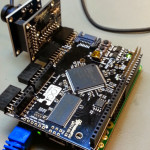
LOGI Boards Blog Posts
We are excited to announce that we are working with KiwiSDR to bring Software Defined Radio to the BeagleBone. WHAT IS KIWISDR? KiwiSDR is a software-defined radio (SDR) covering shortwave, the longwave & AM broadcast bands, various utility stations, and amateur radio transmissions, world-wide, in the spectrum from 10 kHz to 30 MHz.
LOGI Boards Blog Posts
We are excited to announce that the LOGI boards are back in stock at element14. We hope you like the changes made on the new boards. The latest boards are being call Version 2 at element14, with the revision number being R1.5. We hope to keep cranking out the boards and have some designs in
LOGI Boards Blog Posts
We just released a new blog on element14 – Part 2 Implementing gradient Filter. We hope you enjoy and find it useful. Give us any feedback you might have!
LOGI Boards Blog Posts
FPGA Camera Data Processing This is part 1 of a 2 part article which details interfacing a camera to an FPGA, capturing the data and then processing the data using a pipelining technique. One of the many strengths of using an FPGA is the speed and flexibility it gives to processing data in a real-time
LOGI Boards Blog Posts
The Problem Typical obstacle detection on low cost mobile indoor robots are usually performed using a variety of sensors, namely sonar and infrared sensors. These sensors provide poor information that is only able to detect the presence of a reflective surface in the proximity of the sensor and the distance from the surface. While in
LOGI Boards Blog Posts
Hardware/Software Co-design with the LOGI Boards Introduction In a previous blog post ValentF(x) gave an explanation of what FPGAs (field programmable gate arrays) are and how they are a very valuable resource when designing electronics systems. The article went on to describe the major differences in the way FPGAs operate from CPU/MCU technology. Finally, it
LOGI Boards Blog Posts
Alternatives to VHDL/Verilog for Hardware Design Hardware description languages (HDLs) are a category of programming languages that target digital hardware design. These languages provides special features to design sequential logic( the system evolve over time represented by a clock) or combinational logic (the system output is a direct function of its input). While these
LOGI Boards Blog Posts
We could not have done it without YOU! We want to sincerely thank all of those who supported us through our LOGI boards Kickstarter. It was a risk and you chose to give us a chance and it made all the difference. We were able to successfully complete the kickstarter and are ready
LOGI Boards Blog Posts
Mike and Jonathan of ValentF(x) hope to create useful blog posts that serve the purpose of helping electronics generalists to better understand FPGA technology. We hope to create some elementary blogs which walk through basics and then move to working through fun and interesting applications that use common CPU platforms including the Raspberry Pi

LOGI Boards Blog Posts
As you are likely aware there is a new version of the Raspberry Pi available, the B+ version. There have been questions as to whether the current LOGI-Pi R1 is compatible with this new version. The answer is Yes, but to ensure not shorts occur, you will need to put down a piece of kapton